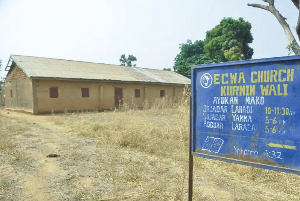If care is not taken, the John Mahama administration will go down in history as the regime which created massive unemployment in the county, instead of creating jobs for the teeming unemployed youth.
First was the wholesale ban on the export of scrap metals, which has kicked thousands of youth in Accra, Tema, Ashaiman, Kumasi, Takoradi, Tamale and many other places out of the scrap metal business, and all the incessant appeal from the dealers to Trade and Industry Minister, Haruna Iddrisu to revise the ban has not yielded any result.
As the scrap metal dealers continue to beg the Mahama government to relax the ban, the same Haruna Iddrisu has issued another notice, banning rice importers from bringing the grains into the country by road, apart from the Kotoka International Airport (KIA), Tema and Takoradi Ports.
The Herald’s information is that the latest ban has led to truckloads of rice, stuck at the Cote’ D’Ivoire end of Ghana’s Western border, waiting to enter the country. Some of the importing companies have their headquarters in that country with their subsidiaries here in Ghana.
Haruna Iddrisu gave the directive on Monday, October 14, 2013, and took effect from Friday, November 1, 2013, once again throwing millions of people, including importers, wholesalers and retailers out of self-employment.
In the case of the scrap dealers, Haruna Iddrisu claimed he was protecting the interests of the local steel companies, but it is unclear whose interest the latest ban on rice import by road is to serve.
Interestingly, most of the steel companies could not even buy the scrap metals despite the preferential treatment they got from the Trade Minister at the expense of the dealers who had gone for huge bank loans to procure these scraps for export.
It is again unclear, whether the Presidency, which is chasing some US$367 million from some Warehouse managers and some importers has sanctioned this ban.
Government’s aim of chasing US$367 million to meet some developmental challenges including, honouring its 200 Secondary Schools electoral promise, the completion of some major roads, like the Eastern Corridor roads, Tetteh Quashie-Mafi, Sofoline Interchange among others.
The Mahama government keeps complaining about rising expenditure amidst low revenue generation.
Haruna Iddrisu’s directive among other things warned that ‘importation of rice through all land frontiers shall be illegal,’ and “any person who imports rice through any port, other than the declared Ports, commits an offence and shall be prosecuted, and in addition have such imports confiscated.”
This policy, as stated in the publication, “is intended to provide a framework of administrative procedures through which the numerous unfair trade practices including evasion of import duties and other taxes, under-invoicing, infringement of trademarks and smuggling shall be controlled”.
It is against this backdrop that members of the Ghana-Ivory Coast Rice Importers and Sellers Association have asked government to reconsider and subsequently withdraw the ban in view of the eminent and indefinable consequences that consumers, importers and the country as a whole could face if the policy is allowed to come into effect.
They lamented that several Ghanaians involved in the rice importation business by land, particularly the small- to medium-scale dealers and those involved in the carting of the commodity and a chunk of others in the retail trade, risk losing their source of livelihood.
This development, according to the importers, would thus more likely lead to huge losses of revenue to the state — given that colossal sums of monies are paid as import duties at the borders of the country whenever they bring in rice.
The intended ban, if not immediately reversed, they reckon, would rather also position the foreigners in the rice importation business to monopolise the trade, considering how uncompetitive the rice market would become and the huge capital that would be required to import through the declared Ports.
They, therefore, appeal to Government to take a second look at the ban, and also take a cue from the outcome of similar policies introduced on tinned tomatoes, textiles and others some time past.
The Government has also been advised to work effectively and immediately to replace Customs officials at the various entry points, if they cannot be trusted to check smuggling activities and tax evaders.
The angry Ghana-Ivory Coast Rice Importers and Sellers Association described the policy as dangerous and unacceptable and has called on the Ministry of Trade and Industry to revise its decision.
The members of the Ghana-Ivory Coast Rice Importers and Sellers Association say, the policy will not only push them out of business, but also has the tendency to affect consumers of rice in the country.
According to them, once the policy comes into effect, it will breed monopoly and create opportunity for few importers to bring the product into the country which will in turn affect demand and supply, and eventually push prices beyond the affordability of average consumers.
At a press conference in Kumasi to register their displeasure against the decision, members of the association lamented that the Government is creating an undue advantage for foreign nationals and businesses to flourish at the expense of indigenes.
They bewailed that local small scale businessmen who cannot afford shiploads and rely on the importation through the country’s corridors, would be pushed completely out of the market, leaving the business solely for foreign nationals.
“As we are all aware that in Ghana, the rice business is controlled by foreigners; all the big importers who can afford to import shiploads of rice are foreigners and it is them who stand to gain and make profit from this policy,” they argued.
Apart from this, the association further noted that prices of rice would significantly shoot up if the policy is implemented, estimating that a 25kg of rice for instance, which is less than Ghc100 will be sold for Ghc150. They also cautioned that a lot of Ghanaians would lose their jobs and become unemployed once the policy comes into force.
According to them, it is not entirely true that those who import rice by land evade taxes and engage in smuggling, stressing that the kind of corruption and malfeasance that go on at the ports and harbors, cannot be compared to that which goes on at the borders if any exist.
They argued further that it would not be fair on the part of government to impose the ban, simply because some of their few colleagues are evading taxes or are engaged in under-invoicing, contending that the best solution is not to ban the importation by land, but rather tighten security at the nation’s borders and increase supervision of tax collection.
Business News of Friday, 15 November 2013
Source: The Herald













